Ferguson protests: How many cities have the same problems?
- Published
- comments
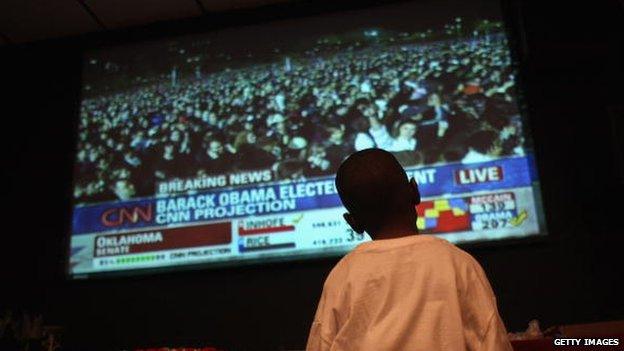
Obama's election was a watershed moment for black Americans but it was not enough
The cable channels captured it perfectly. Soon after the prosecutor announced there would be no indictment, Barack Obama made a highly unusual late-night statement from the White House.
The news channels split the TV screen, as they often do. On one side, the president and commander-in-chief of the most powerful army in the world was appealing for calm from protesters and restraint from law enforcement. On the other side, the live shots showed the chaos unfold as Ferguson was blanketed in tear gas and fire. Since the shooting of Michael Brown, America has been enveloped in a wider debate.
Not new questions - anything but - but questions that were pushed into the background with the election of the United States' first African-American president.
In 2008, those heady days when Mr Obama was first elected, there was the genius slogan that captured the trajectory and history of the civil rights struggle.
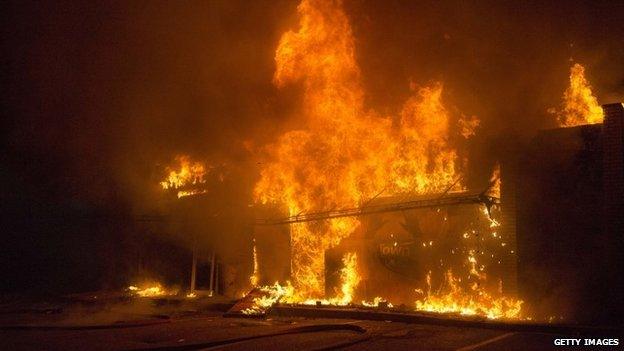
A business burns after the Ferguson decision on Monday
"Rosa sat, so that Martin could walk, so that Barack could fly" - to which might be added today -"but people like Michael Brown will still get shot by white police officers."
The other phrase that was heard again and again was, "So what's your excuse?"
It was a challenge to the black community from within the black community - to stop making excuses and seize the day, make the most of the myriad opportunities that were ripe for the picking. After all, if an African-American can go all the way to the highest office in the land, what's stopping you?
America was gripped by the 'Yes We Can" mantra - and perhaps myth.
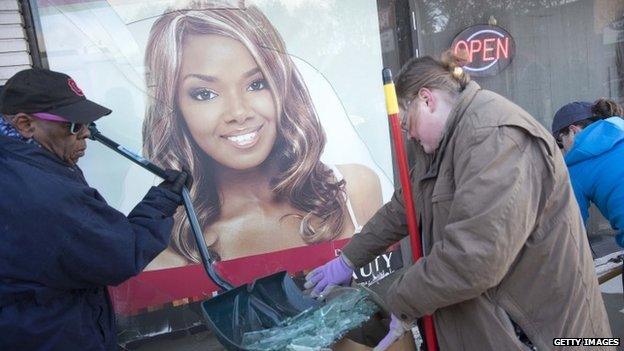
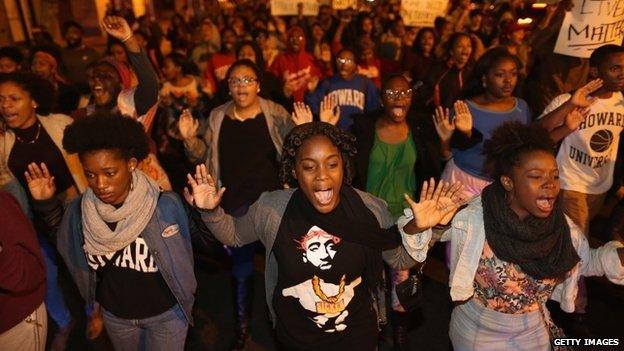
Big questions about black Americans and how the justice system treats them remains
For a while, "post-racial" was the watchword. And with it, the debate about disadvantage, discrimination, disaffection (and probably a whole pile of other good sociological words beginning with dis-) seemed to disappear.
Certainly at first, the issue of race was something that Mr Obama preferred not to talk about. His speeches on the topic usually came only after events forced him to address it.
In the last year, Mr Obama has become more vocal about issues facing the black community. His "Brother's Keeper" initiative seeks to improve outcomes for young black men in America - outcomes like the fate of Michael Brown, shot dead in the street a few days before he was to start college.
Big questions that seemed to be swept under the post-racial rug are being asked once again: Why was an overwhelmingly black area policed by predominantly white officers? Why is there such mistrust among that community of the forces of law and order? Why, if you're black, are you much more likely to be a victim of crime? Why, if you're black, are you much more likely to end up in prison? Why are you more likely to be unemployed?
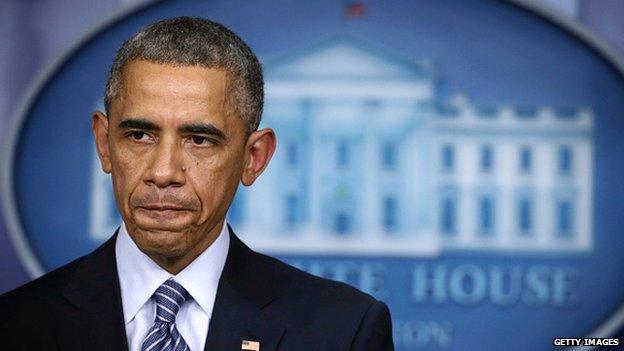
Obama's speeches on race relations have largely been limited to when events called for it
The president engaged in that debate on Monday night, saying that the situation in Ferguson spoke to broader challenges that the US faced. He acknowledged that some of this was the legacy of racial discrimination. He said violence could never be justified, but recognised that the legal system often felt as if it was being applied in a discriminatory fashion.
The violence in Ferguson was as awful as it was predictable. There were those in the crowd who had clearly come dressed for a fight, and would have been disappointed if they had gone home without one.
And there will be those politicians, who will use that violence by the mob as an excuse for inaction. There is nothing easier than to condemn the troublemakers and wilfully ignore the message that the angry but peaceful protesters are trying to send. And - boy - if you could sell anger, you would make a fortune in Ferguson. The fury is genuine.
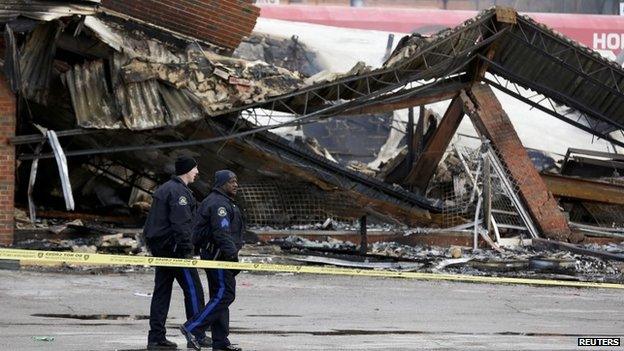
Ferguson is likely only one place in America dealing with similar problems
Some are invoking the Selma marches and Martin Luther King, and saying that the civil rights movement is as relevant today as it was in the last century
Though an infamous race riot in St Louis left dozens of black Americans dead in 1917, modern-day Ferguson wasn't on many radar screens as a potential flashpoint for racial violence - until the shooting of Michael Brown. It's in one of the so-called flyover states: a place that many Americans travel above as they fly from east to west or the other way.
The uncomfortable question for America is how many other towns and cities across the land have exactly the same cocktail of problems that one spark could ignite?